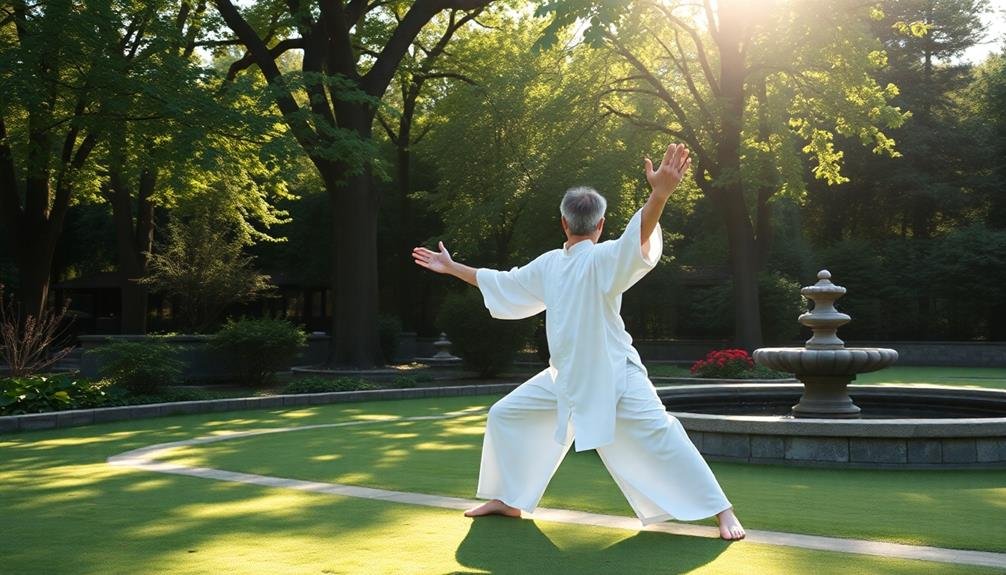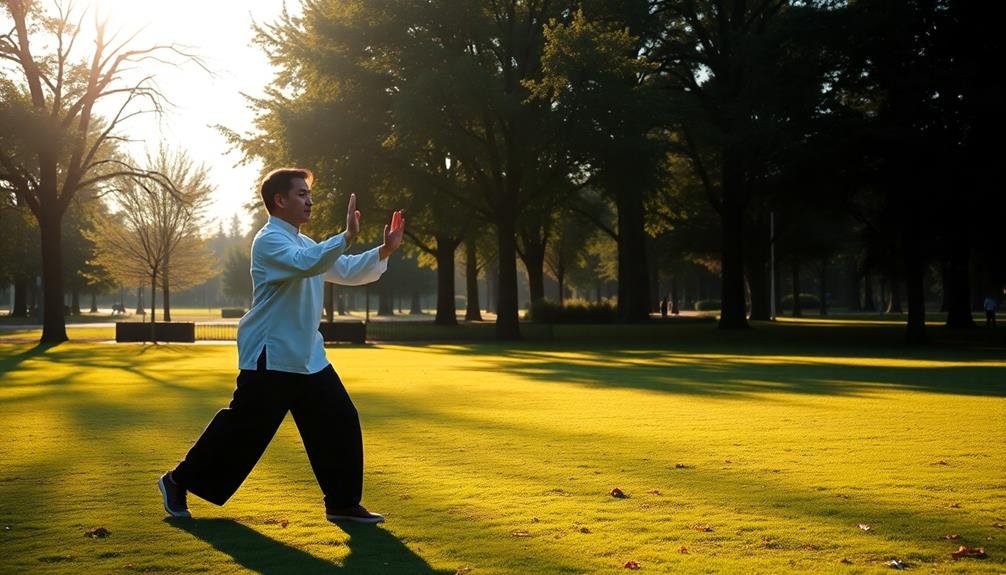Tai Chi offers three powerful benefits for anxiety relief. First, it cultivates mindfulness and present moment awareness, helping you break free from worries about the past or future. Second, it teaches improved breathing techniques that activate your body's relaxation response, giving you a tool you can use anytime to combat anxiety. Third, Tai Chi enhances the connection between your body and mind, allowing you to recognize and address stress triggers more effectively. By practicing Tai Chi, you'll develop a greater sense of calm, balance, and control over your emotions. Discover how this ancient practice can transform your approach to managing anxiety.
Mindfulness and Present Moment Awareness

Awareness lies at the heart of Tai Chi's anxiety-relieving effects. As you practice Tai Chi, you'll learn to focus your attention on the present moment, letting go of worries about the past or future. This mindfulness helps you become more attuned to your body's sensations, thoughts, and emotions without judgment.
Through slow, deliberate movements, Tai Chi encourages you to concentrate on your breath and physical sensations. You'll notice the feeling of your feet grounding into the earth, the gentle stretch of your muscles, and the flow of your breath. This heightened awareness can help interrupt anxious thought patterns and bring you back to the here and now.
As you consistently practice Tai Chi, you'll develop a greater capacity to remain present in your daily life. You'll find yourself better able to recognize anxiety triggers as they arise and respond to them with calmness and clarity.
This increased mindfulness can lead to improved emotional regulation and a reduced overall sense of anxiety, allowing you to approach life's challenges with greater ease and composure.
Improved Breathing Techniques
Building on the mindfulness cultivated through Tai Chi, proper breathing techniques play a key role in managing anxiety. As you practice Tai Chi, you'll learn to focus on your breath, which can help calm your mind and reduce stress. You'll discover how to breathe deeply from your diaphragm, filling your lungs completely and exhaling slowly.
This type of controlled breathing activates your parasympathetic nervous system, triggering a relaxation response in your body. It's a powerful tool you can use anytime, anywhere to combat anxiety symptoms.
You'll also learn to synchronize your breath with your movements, creating a flowing, meditative state that further eases tension. Tai Chi's emphasis on slow, deliberate breathing can improve your overall lung capacity and oxygen efficiency.
This increased oxygenation can boost your energy levels and mental clarity, helping you feel more equipped to handle anxiety-inducing situations. As you become more aware of your breathing patterns, you'll be able to recognize when stress is affecting your respiration and quickly implement calming techniques.
With consistent practice, these improved breathing techniques will become second nature, providing you with a reliable method for managing anxiety in your daily life.
Increased Body-Mind Connection

Tai Chi forges a powerful link between your body and mind, enhancing your overall self-awareness. As you practice the slow, deliberate movements, you'll find yourself becoming more attuned to your physical sensations and mental state.
This increased body-mind connection can greatly reduce anxiety by helping you recognize and address stress triggers more effectively. You'll learn to pay attention to subtle changes in your body, such as muscle tension or irregular breathing, which often accompany anxious thoughts.
By identifying these physical cues, you can intervene early and prevent anxiety from escalating. Tai Chi's focus on present-moment awareness also helps quiet racing thoughts, allowing you to stay grounded in the here and now.
The practice encourages you to synchronize your movements with your breath, further strengthening the body-mind connection. This coordination promotes a sense of inner calm and balance, making it easier to manage stress and anxiety in daily life.
As you progress, you'll develop a greater sense of control over your body and mind, boosting your confidence in handling anxiety-inducing situations.
Frequently Asked Questions
How Long Does It Take to See Anxiety Relief Benefits From Tai Chi?
You'll likely notice anxiety relief benefits from tai chi within a few weeks of regular practice. However, it's different for everyone. Stick with it consistently, and you'll gradually experience more significant improvements in your anxiety levels over time.
Can Tai Chi Be Practiced by People With Physical Limitations or Injuries?
Yes, you can practice Tai Chi even with physical limitations or injuries. You'll find it's adaptable to your needs. Many instructors offer modifications, and there are seated versions available. Always consult your doctor before starting any new exercise program.
Are There Specific Tai Chi Forms Best Suited for Anxiety Management?
You'll find several Tai Chi forms beneficial for anxiety management. Focus on gentle, flowing movements like "Lifting the Sky" or "Embracing the Moon." Practice breath-synchronized routines and mindfulness-based forms to calm your mind and reduce stress.
How Often Should One Practice Tai Chi for Optimal Anxiety Relief Results?
You'll see the best results by practicing Tai Chi daily for 15-30 minutes. If that's not possible, aim for at least 3-4 sessions per week. Consistency is key, so find a routine that works for you and stick to it.
Can Tai Chi Be Combined With Other Anxiety Treatments or Medications?
Yes, you can combine Tai Chi with other anxiety treatments or medications. It's often used as a complementary therapy. However, always consult your doctor before making changes to your treatment plan or starting new practices.
In Summary
You've discovered three powerful ways tai chi can help ease your anxiety. By practicing mindfulness, you're learning to stay grounded in the present. With improved breathing techniques, you're giving yourself a natural tool to calm your nerves. And as you increase your body-mind connection, you're building resilience against stress. Remember, consistency is key. The more you practice tai chi, the more you'll feel its anxiety-relieving benefits. Why not start incorporating these techniques into your daily routine today?





Leave a Reply